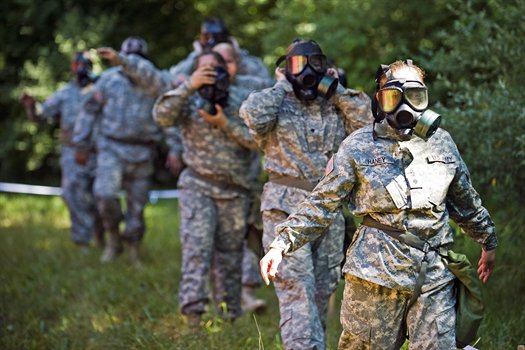The Obama administration is working closely with Jordan and Turkey, pressing military forces there to take principal responsibility for safeguarding Syria’s chemical weapons sites in case they become vulnerable to theft or misuse and providing equipment and training in order to do so.

Soldiers exit the gas chamber after being exposed to tear gas during a simulated chemical weapons attack on Camp Atterbury, Ind., June 22, 2012. U.S. Army photo by Sgt. John Crosby
The Obama administration has decided that, rather than deploying US forces into Syria in the case that Assad falls, or the chemical weapons sites become unprotected or subject to theft by rebel jihadists, allied forces in Jordan and Turkey should take primary responsibility for going in and securing the depots.
“Washington has decided,” according to Jeffrey Smith of the The Center for Public Integrity, who first reported the story, “that the best course of action in the aftermath of Syrian President Bashar Assad’s possible fall would be to get the nerve agents out of the country as quickly as possible, so it’s begun discussions not only with Jordan and Turkey, but also with Iraq and Russia to chart the potential withdrawal of the arsenal and its destruction elsewhere.”
The State Department on Wednesday responded to reports that the Assad regime used a chemical agent against rebel forces in Homs, insisting that the US does not believe such allegations are true.
The Obama administration has stated in recent months that the use of chemical weapons against the Syrian people by the Assad regime is a “red line,” presumably beyond which would prompt US intervention against the regime.
But the truth is, Washington doesn’t perceive any viable plan for military intervention against the Assad regime. Beyond the vastly increased destruction and humanitarian suffering it would cause, the Assad regime appears to be the only thing preventing jihadist terrorists from taking control of the country.
Moreover, the President appears reluctant to commit troops to another military intervention in the Middle East, after ten years of conventional military quagmires in Iraq and Afghanistan.
US General Martin Dempsey, Chairman of the Joint Chiefs, said last week that “The act of preventing the use of chemical weapons [in Syria] would be almost unachievable…”
And as Aaron David Miller, a former Middle East advisor to six Secretaries of State, wrote recently, “all of the military options for intervention [in Syria] have been heavily skewed toward risk rather than reward.”
Michael Eisenstadt of the typically hawkish Washington Institute for Near East Policy,wrote recently “While the United States does not have an interest in strengthening Assad, it does have an interest in the regime retaining control over its [chemical weapons] for as long as it is around,” reflecting Washington’s deep desire to keep Syria’s weapons stockpiles out of the hands of the rebels and terrorist groups now fighting the regime.
US military officials have been quick to point out the costs of war in Syria and the White House has consistently said that direct military intervention “would lead to greater chaos, greater carnage.”


